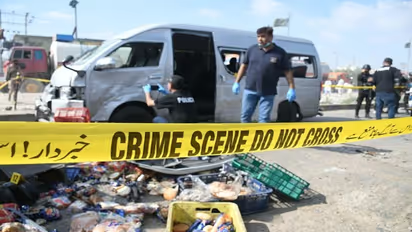10 years since Peshawar massacre, terror remains: 924 killed in 1,566 attacks in Pakistan over past 10 months

Synopsis
Over the past 10 months alone, Pakistan has endured 1,566 terrorist attacks, claiming 924 lives, including civilians and law enforcement officers, according to the interior ministry.
Ten years after the harrowing massacre at the Army Public School in Peshawar, where the Pakistani Taliban brutally ended the lives of around 150 individuals—mostly children—the wounds remain fresh for the victims’ families. Among them is Ajoon Khan, a grieving father whose son was among those dead. A lawyer by profession, Khan recounts the haunting scenes of despair. “I could never forget the parents sobbing and pleading outside the school gates,” he shared.
The devastating attack in December 2014 united Pakistan’s political factions for launch of an ambitious counterterrorism initiative. A sweeping military operation pushed insurgents into Afghanistan. Large-scale attacks saw a sharp decline, with fatalities plummeting from 2,451 across 1,717 attacks in 2013 to just 220 deaths in 146 attacks by 2020.
But that fragile peace now teeters on the brink of collapse.
A resurgent threat
In the wake of the Afghan Taliban’s rise to power in August 2021, militant violence has surged across Khyber Pakhtunkhwa province and beyond. Over the past 10 months alone, Pakistan has endured 1,566 terrorist attacks, claiming 924 lives, including civilians and law enforcement officers, according to the interior ministry. The militant group Tehreek-e-Taliban Pakistan (TTP), emboldened by newfound resources and safe havens, has escalated its offensive.
Just last week, a deadly assault claimed the lives of 16 soldiers in South Waziristan, with the TTP later claiming responsibility.
Experts highlight a confluence of factors undermining Pakistan’s fight against terrorism; political instability, weak governance, economic woes, and dwindling public support. The withdrawal of US counterterrorism assistance following the end of its two-decade-long war in Afghanistan has further compounded Pakistan’s challenges.
"The greatest challenge lies in mobilizing the necessary financial resources and manpower for operations across such vast regions," noted Muhammad Amir Rana, director of the Pak Institute for Peace Studies in Islamabad.
A key source of Pakistan’s troubles, experts assert, lies across the border in Afghanistan. Despite Kabul’s denials of harboring TTP militants, Asfandyar Mir, a senior expert at the United States Institute of Peace, asserted that the TTP has been provided "a permissive safe haven in Afghanistan," making it "resilient and lethal."
Privately, Pakistani officials admit to a strategic misjudgment. They had anticipated that the Afghan Taliban, indebted to Pakistan for covert support during the US-led war, would curb TTP’s influence. Instead, Kabul has reportedly supplied the TTP with advanced American-made weapons and resources seized during Afghanistan’s governmental collapse.
The consequences have been dire. From January’s suicide bombing in Peshawar, which killed over 100 worshippers, to a relentless campaign aiming to overthrow the Pakistani government, the TTP’s resurgence has left a trail of destruction.
Meanwhile, Pakistan’s security forces grapple with another crisis: a long-standing conflict with ethnic separatist groups in Balochistan. The province, home to the strategic Chinese-run Gwadar port, has also witnessed intensifying violence, further stretching Pakistan’s strained resources.
Also read: Single Chinese women are doing maternity photoshoots with fake baby bumps. Here's why
Check the Breaking News Today and Latest News from across India and around the world. Stay updated with the latest World News and global developments from politics to economy and current affairs. Get in-depth coverage of China News, Europe News, Pakistan News, and South Asia News, along with top headlines from the UK and US. Follow expert analysis, international trends, and breaking updates from around the globe. Download the Asianet News Official App from the Android Play Store and iPhone App Store for accurate and timely news updates anytime, anywhere.